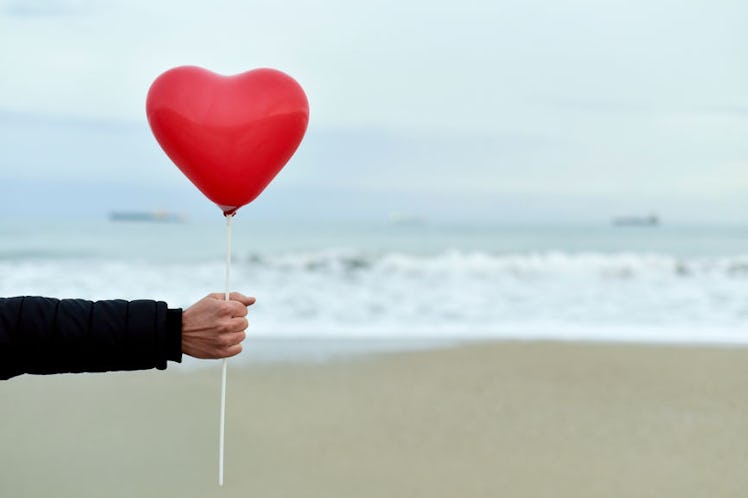
Headspace's New Course Is Just What You Need If You're Single On Valentine's Day
For those of us in relationships, Valentine’s Day can be super exciting. It’s a time to publicly announce your love for your partner to the world, and you get to spend a whole day dedicated to your feelings for one another. Especially if you’re into grand gestures of affection, this holiday can feel like the perfect excuse to go all out. But for those of us who are single, or even recently went through a breakup, the day of love might remind us of how alone we feel. Luckily, the meditation app Headspace’s “Reframing Loneliness” course is a Valentine’s Day indulgence for anyone who is feeling down on Feb. 14.
The holiday of romance sometimes feels like the opposite for people grieving the lack of a relationship. More than any other time of year, social media is plastered with photos of couples giving each other flowers, pink candy hearts, or exclusive dinner dates. They’re all feeling #thankful and #blessed, and you’re over here just wishing your pizza delivery guy would hurry it up already. Ugh, can this day just be over yet? What's the latest thing I can binge on Netflix?
One of the best things I’ve done for myself to calm down when I’m feeling lonely and anxious is to meditate daily. About six months ago, I started using Headspace, a subscription-based meditation platform that breaks the practice down into easy, manageable steps. Although I still have mornings where I’m more distracted than others, overall I’ve come to love how it makes me feel. I spend 10 minutes each weekday morning centering myself and my intentions for the day, and it’s a good reminder of how worthy I am of love and care, whether or not I have a romantic partner.
So when the Headspace team told me about the new course they released on Jan. 28, just in time for Valentine’s Day, I couldn’t have been more excited. A Valentine’s Day treat for single people? What a fun idea! “Reframing Loneliness” is all about identifying the difference between being alone and feeling alone. The 10-day study can help you realize that you’re actually less alone than you think. Although it’s easy to feel like we have no one to turn to, the reality is that when we learn to be content with our mind and our surroundings, feelings of loneliness can dissipate faster than you might expect.
As it turns out, loneliness can wreak some serious havoc on your brain, so it’s no wonder it makes us feel crappy. Sarah Romotsky, Head of Health and Science Strategy at Headspace, explains it this way: “Danger signals activated in the brain by loneliness affect the production of white blood cells, which can impair the immune system’s ability to fight infections," she tells Elite Daily. Yep, you read that right. Your brain actually gives off the same signals when you’re lonely as it does when you’re facing a threat. Humans were designed to live in community and seek connection, so when you feel distant from the people in your life, it certainly feels like cause for physical stress.
“Mindfulness can help bring more awareness to the feeling of loneliness, therefore allowing the space to learn to relate to it in a new way,” Romotsky says. “It also helps us be compassionate to ourselves and to others, as loneliness is a very common experience for everyone.” Knowing how many other people feel lonely can actually make us feel less alone!
For someone who has recently gone through a breakup, it’s extra important to take time on Valentine’s Day to be grateful for the strong and resilient person you are. Romotsky suggests unplugging, whether it’s for the whole day or just for an hour or so, and using the time to intentionally connect with a friend or loved one. She also says it’s fun to do small favors for people, and to make an effort to do even the kindest things for others, which will in turn make you feel happier and more connected.
You can still feel mindful and aware of your surroundings even when you’re not actively meditating. “You can integrate mindfulness into your day by bringing more awareness and compassion to the things you are already doing,” Romotsky advises. “For example, try approaching your next meal more mindfully (Headspace has mindful eating content that can help!), your commute, or your next meeting with co-workers.” If you stay focused on your brain and the energy it’s putting out into the world, it can work wonders for your peace of mind.
If you’re looking to start a meditation practice but not sure where to begin, Romotsky suggests setting a small goal. “The most important thing about a meditation routine is to be consistent as the benefits build over time,” she says. “Start with a small, measurable, achievable goal for yourself (ex: I’m going to meditate three times a week for 10 minutes a day).” This will keep the practice from feeling too overwhelming, and you’ll still be able to see results.
Remember that just because you don’t have a valentine doesn’t mean you’re not worth celebrating. Show the kind of compassion to yourself that you’d like for others to show you, and your joy will radiate out to everyone in your midst. There’s only one you, and that’s something to be proud of — so treat yourself like the queen you are, because you deserve it!